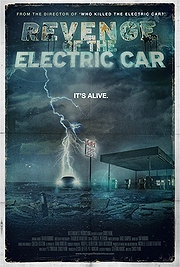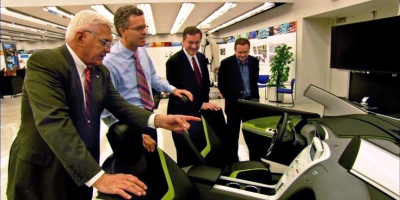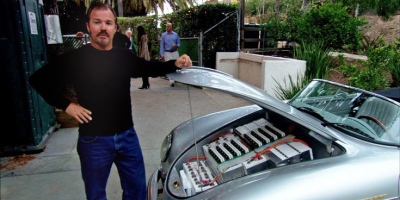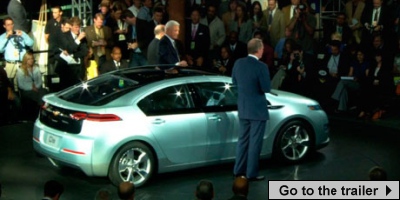Revenge of the Electric Car

Revenge follows three key players in the electric car game: cigar-chomping General Motors executive and recent electric car convert, Bob Lutz; eccentric, actress-banging dotcom entrepreneur Elon Musk, who co-founded paypal and now runs the fledgling Tesla Motors; and Carlos Ghosn, the president of Nissan and the most intimidatingly focussed businessman since that economist that sorted out Weimar Germany. Kudos to director Chris Paine, as these are arguably the three biggest players in the game, and certainly the most interesting. We also drop in on Greg ‘Gadget’ Abbott, who puts electric engines into petrol-driven cars – a canny move that keeps this tale of billionaires waging a war from becoming too alienating.
Bob, we learn, is a recent convert to the cause who many blame for the death of the last wave of electric cars, and who’s haunted by both his past and his impending retirement – he’s running out of time to make a difference. Tesla Motors is the industry’s sexy poster boy, but Elon’s ambition and motor-mouth make for an extremely risky enterprise. Carlos, whose interest in the electric car is driven purely by business, is so convinced that these cars are the future that he’s essentially bet Nissan’s entire future on the Leaf, an affordable electric hatchback. Garnish all this intrigue with a Tim Robbins voiceover and talking heads from top journalists, Danny DeVito and, bizarrely, Anthony Kiedis from Red Hot Chili Peppers (looking every bit like Danny Trejo in the final stages of radiation sickness) and – hey – we’ve got a real contender here.
And then, we hit 2008 – y’know, the year that killed Kristen Wiig’s cupcake business – and the bottom falls out of the world. General Motors ends up so royally in the shit that the US government is forced to bail them out. Tesla Motors comes so perilously close to catastrophe that they’re forced to increase the price of pre-orders – to people who have already paid – and Elon whittles his fortune down to his last million just to keep the cheques from bouncing. But these pale in comparison to the fate of poor Gadget Abbott, who loses his life’s work and hundred and thousands of dollars worth of equipment when his (uninsured) garage is burned to the ground, forks out an outrageous amount of money for a new one, and is promptly forced to abandon it because it’s literally poisonous.

Exciting scenes of applauding expo crowds, cigar-chomping progress and time-lapse shots of cityscapes on a sunny day are replaced by strolls round abandoned warehouses, angry confrontations with disappointed customers and shareholders, and time-lapse shots of cityscapes on an overcast day. This continues for the best part of an hour, an ever-spirally, Dante-esque descent into despair as even our heroes – with the exception of Ghosn, who’s pretty much unreadable – give up pretending that everything isn’t totally fucked.
“But it’s OK,” you’re thinking, “because I’ve seen this movie, I know what’ll happen, by the end everything will WAIT WHAT NO WHAT THAT CAN’T BE IT.” The movie ends with the most minuscule, meagre amount of upswing, with Tesla motors slightly turning things around, GM continuing to exist and Gadget having a successful New Year’s Eve Party (that said, it’s a successful New Year’s Eve Party with the anvil of ‘Nothing is OK for this guy yet’ hanging over it). But that’s it. Where’s the revenge?
As much as I’m reluctant to blame the director, the problem with The Revenge of the Electric Car is that he really shouldn’t have stopped making it yet. A cursory Google reveals that Tesla Motors is now thriving, and have just released a significantly cheaper roadster, and that Nissan’s Leaf is just as healthy. General Motors are on the up and up and Gadget.. well, Gadget’s very hard to Google.

You can’t direct life. Sometimes you can guide it, and lot of stuff you can make more sense of in post. You can get all the big names in, you can dress it up real pretty and you can pour all your energies into it but sometimes the best policy is just to cover your arse. Your Timoners, your Herzogs: these guys put out great documentaries because she’s highly adaptable and he keeps things small (cast, locations and crucially timespan). Paine clearly set out to tell one story, and when life didn’t give him that story, he tried to tell it anyway.


Recent Comments